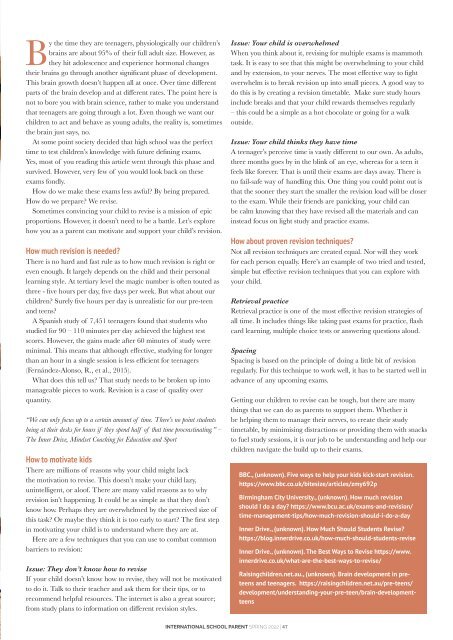International School Parent Magazine - Spring 2022
You also want an ePaper? Increase the reach of your titles
YUMPU automatically turns print PDFs into web optimized ePapers that Google loves.
By the time they are teenagers, physiologically our children’s<br />
brains are about 95% of their full adult size. However, as<br />
they hit adolescence and experience hormonal changes<br />
their brains go through another significant phase of development.<br />
This brain growth doesn’t happen all at once. Over time different<br />
parts of the brain develop and at different rates. The point here is<br />
not to bore you with brain science, rather to make you understand<br />
that teenagers are going through a lot. Even though we want our<br />
children to act and behave as young adults, the reality is, sometimes<br />
the brain just says, no.<br />
At some point society decided that high school was the perfect<br />
time to test children’s knowledge with future defining exams.<br />
Yes, most of you reading this article went through this phase and<br />
survived. However, very few of you would look back on these<br />
exams fondly.<br />
How do we make these exams less awful? By being prepared.<br />
How do we prepare? We revise.<br />
Sometimes convincing your child to revise is a mission of epic<br />
proportions. However, it doesn’t need to be a battle. Let’s explore<br />
how you as a parent can motivate and support your child’s revision.<br />
How much revision is needed?<br />
There is no hard and fast rule as to how much revision is right or<br />
even enough. It largely depends on the child and their personal<br />
learning style. At tertiary level the magic number is often touted as<br />
three - five hours per day, five days per week. But what about our<br />
children? Surely five hours per day is unrealistic for our pre-teen<br />
and teens?<br />
A Spanish study of 7,451 teenagers found that students who<br />
studied for 90 – 110 minutes per day achieved the highest test<br />
scores. However, the gains made after 60 minutes of study were<br />
minimal. This means that although effective, studying for longer<br />
than an hour in a single session is less efficient for teenagers<br />
(Fernández-Alonso, R., et al., 2015).<br />
What does this tell us? That study needs to be broken up into<br />
manageable pieces to work. Revision is a case of quality over<br />
quantity.<br />
“We can only focus up to a certain amount of time. There’s no point students<br />
being at their desks for hours if they spend half of that time procrastinating.” –<br />
The Inner Drive, Mindset Coaching for Education and Sport<br />
How to motivate kids<br />
There are millions of reasons why your child might lack<br />
the motivation to revise. This doesn’t make your child lazy,<br />
unintelligent, or aloof. There are many valid reasons as to why<br />
revision isn’t happening. It could be as simple as that they don’t<br />
know how. Perhaps they are overwhelmed by the perceived size of<br />
this task? Or maybe they think it is too early to start? The first step<br />
in motivating your child is to understand where they are at.<br />
Here are a few techniques that you can use to combat common<br />
barriers to revision:<br />
Issue: They don’t know how to revise<br />
If your child doesn’t know how to revise, they will not be motivated<br />
to do it. Talk to their teacher and ask them for their tips, or to<br />
recommend helpful resources. The internet is also a great source;<br />
from study plans to information on different revision styles.<br />
Issue: Your child is overwhelmed<br />
When you think about it, revising for multiple exams is mammoth<br />
task. It is easy to see that this might be overwhelming to your child<br />
and by extension, to your nerves. The most effective way to fight<br />
overwhelm is to break revision up into small pieces. A good way to<br />
do this is by creating a revision timetable. Make sure study hours<br />
include breaks and that your child rewards themselves regularly<br />
– this could be a simple as a hot chocolate or going for a walk<br />
outside.<br />
Issue: Your child thinks they have time<br />
A teenager’s perceive time is vastly different to our own. As adults,<br />
three months goes by in the blink of an eye, whereas for a teen it<br />
feels like forever. That is until their exams are days away. There is<br />
no fail-safe way of handling this. One thing you could point out is<br />
that the sooner they start the smaller the revision load will be closer<br />
to the exam. While their friends are panicking, your child can<br />
be calm knowing that they have revised all the materials and can<br />
instead focus on light study and practice exams.<br />
How about proven revision techniques?<br />
Not all revision techniques are created equal. Nor will they work<br />
for each person equally. Here’s an example of two tried and tested,<br />
simple but effective revision techniques that you can explore with<br />
your child.<br />
Retrieval practice<br />
Retrieval practice is one of the most effective revision strategies of<br />
all time. It includes things like taking past exams for practice, flash<br />
card learning, multiple choice tests or answering questions aloud.<br />
Spacing<br />
Spacing is based on the principle of doing a little bit of revision<br />
regularly. For this technique to work well, it has to be started well in<br />
advance of any upcoming exams.<br />
Getting our children to revise can be tough, but there are many<br />
things that we can do as parents to support them. Whether it<br />
be helping them to manage their nerves, to create their study<br />
timetable, by minimising distractions or providing them with snacks<br />
to fuel study sessions, it is our job to be understanding and help our<br />
children navigate the build up to their exams.<br />
BBC., (unknown). Five ways to help your kids kick-start revision.<br />
https://www.bbc.co.uk/bitesize/articles/zmy692p<br />
Birmingham City University., (unknown). How much revision<br />
should I do a day? https://www.bcu.ac.uk/exams-and-revision/<br />
time-management-tips/how-much-revision-should-i-do-a-day<br />
Inner Drive., (unknown). How Much Should Students Revise?<br />
https://blog.innerdrive.co.uk/how-much-should-students-revise<br />
Inner Drive., (unknown). The Best Ways to Revise https://www.<br />
innerdrive.co.uk/what-are-the-best-ways-to-revise/<br />
Raisingchildren.net.au., (unknown). Brain development in preteens<br />
and teenagers. https://raisingchildren.net.au/pre-teens/<br />
development/understanding-your-pre-teen/brain-developmentteens<br />
INTERNATIONAL SCHOOL PARENT SPRING <strong>2022</strong> | 47














